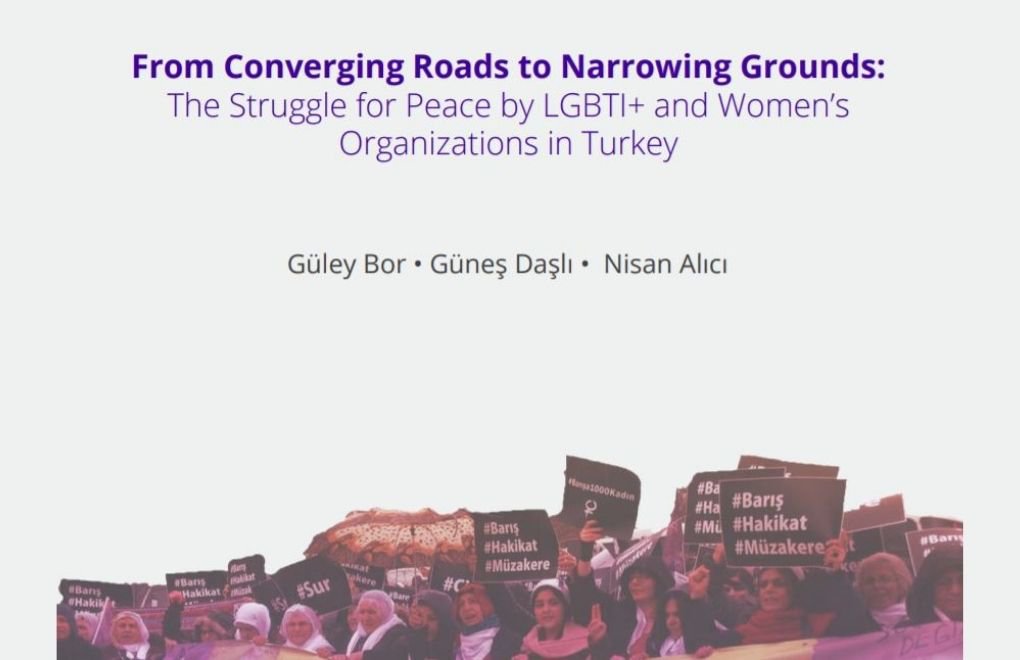Click to read the article in Turkish
"Peace is not just silencing the guns. In many regions where there is no armed conflict, we know that women face a multitude of issues such as sexual and physical violence, discrimination, poverty, forced migration, exploitation of labor, etc.
"In that perspective, the demand for a peaceful life for women also means creating solutions for them and many other problem areas they face. While it is an important demand that women be able to build a life in safety where guns are silent, they are also aware that a long-term struggle is needed to ensure a genuine, peaceful environment.
A woman from the Kurdish Women's Movement...
Research Association for Democracy, Peace and Alternative Politics (DEMOS) has released its new research report in Turkish and English: "From Converging Roads to Narrowing Grounds: The Struggle for Peace by LGBTI+ and Women's Organizations in Turkey".
Authored by Güley Bor, Güneş Daşlı and Nisan Alıcı, the DEMOS report examines how LGBTI+ and women's organizations that have been struggling for for peace in Turkey understand peace and the practices involved in their struggle, by centering the peace process which took place for a peaceful transformation of the Kurdish conflict in Turkey.
Through in-depth interviews with participants from various LGBTI+ and women's organizations that undertook activities on peace surrounding the 2013-2015 peace process, the report takes a closer look at experiences of organizations with a gender focus in the peace struggle.
It also discusses certain concepts found significant in terms of the relationship between gender and peace, aiming to leave a record for potential processes in the future by looking at the period when the hope for peace was the strongest through the eyes of grassroots actors.
Some conclusions from the report
Based on the aforementioned in-depth interviews, the DEMOS report has come to the following conclusions in brief:
"This research and our previous studies show that it is essential for women and lubunyas (queers, in Turkish) to act jointly to see that their needs are heard as part of the demands in the struggle, and to ensure their participation as actors in peace processes. Although the political conditions make it very difficult to focus on the peace struggle at the moment, it is also very important to increase the contact areas between these movements for any potential future peace process.
"The period we are currently in presents a unique opportunity for LGBTI+ and women's organizations, who often come from different ideologies, understandings of gender, and styles of politics and who keep their faith in the importance of the peace struggle to think together on ways to unify with rapid and concrete demands around peace.
"One fundamental way of increasing this contact is to bring organized people in these movements together physically, in safety, and free from concern about shortage of resources. Many participants we interviewed stated that the areas for coming together that formed spontaneously and easily a few years ago are now very difficult to achieve.
"For this reason, a good method could be to organize trips, retreats and facilitating organizations that focus on creating these spaces. Many human rights defenders face oppression and risks on a daily basis, and women and LGBTI+ activists are no exception. Support centered on the well-being of activists should be a key consideration while creating these spaces.
A major area for support that might prove useful in this period could be to look at what activists who previously organized for peace currently need in their struggle for fundamental rights and freedoms.
"Many young LGBTI+ activists and women fighting for their rights and freedoms mobilized after the peace process had ended and even after the state of emergency. This indicates that they experienced processes such as the criminalization of peace, preserving their existence, and introversion without the benefits of the ceasefire period.
"Despite this (or maybe exactly because of this), the struggle for equality and democracy among young women and LGBTI+ youth is strong.
"Young people may not remember the days when the word "peace" could be uttered without instant legal investigation, not surprising considering that even the participants who built the peace discourse had difficulty remembering those days.
"Therefore, remembering, sharing and reflecting on the experiences of women and LGBTI+ organizations in the peace process could pave the way for reuniting around the demand for peace under these new and different conditions. It can serve as a road map, especially for young women and LGBTI+ youth, to take part in the struggle.
This report, which observes the peace efforts of LGBTI+ and women's organizations by focusing on the peace process, is first and foremost an attempt to revive the memory.
"We believe that remembering, reflecting on and recognizing such complex experience and knowledge had an empowering effect both for those of us who conducted the research and for the participants.
"In addition, one of the prominent needs of this period is to strengthen the actors in the peace struggle through tools such as reflection, research and experience sharing on the ways and methods of doing peace work as the conflict continues and while living under an authoritarian regime."
(EMK/SD)




